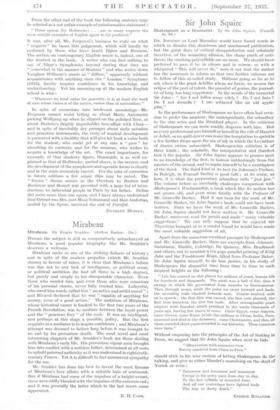Sir John Squire
Da. Jonsrsox or Lord Macaulay would have found words in which to dismiss this disastrous and unashamed publication, but the great days of critical disapprobation and scholarly invective, of the wounding allusion, the sharp pinch of anti- thesis, the crushing polysyllable are no more. We should have preferred to pass it by in silence and in sorrow, or with a whispered " This will never do," were it not that the author has the assurance to inform us that two further volumes are to follow of this so-called study. Without going so far as to ask where is the great Achilles whom we knew, we mourn the eclipse of the poet of talent, the parodist of genius, the journal- ist of long, too long experience. In the words of the immortal Sir John : " Am I not 'fallen away vilely ? Do I not bate ? Do I not dwindle ? I am withered like an old apple- john."
In the performance of Shakespeare we have often had occa- sion to prefer the amateur, the undergraduate, the schoolboy to the star actor and the Stratford player. In the criticism of Shakespeare we can More readily dispense with him. But as every professional sees himself or herself in the role of Hamlet or Juliet, so no quill-driver can resist the temptation to sprinkle a few further drops upon the sea of ink in which the Leviathan of drama swims submerged. Shakespearian criticism is of three kinds ; the scholarly, the interpretative and (hardest task I) the popular. Sir John Squire appears to possess next to no knowledge of the first, to borrow unblushingly from the masters of the second, and to aspire himself to be a mouthpiece of the third. The third kind at its best (in Johnson,:s Preface, in Raleigh, in Pearsall Smith), is good talk ; at its worst, as here, it is what the preparatory schoolboy calls " just jaw." The volume before us inevitably challenges comparison with Shakespeare's Workmanship, a book which like its author has not grown old, and even more fatally with the Prefaces of Mr. Granville Barker: Had it not been for the work of Mr. Granville Barker, Sir John Squire's bobk could not have been written. Since we have the work of Mr. Granville Barker, Sir John Squire should not have written it. Mr. Granville Barker, moreover, read the proofs and made " many valuable suggestions." We can only suppose that he enjoyed his Thyestean banquet or as a candid friend he would have made the most valuable suggestion of all.
Apart from the numerous excellent passages by Shakespeare and Mr. Granville Barker, there are excerpts from Johnson, Swinburne, Hazlitt, Coleridge, De Quincey, Miss Bradbrook and others., not to mention a ten page parallel printing of King John and the Troublesome Reign, lifted from Professor Baker. Sir John Squire himself, to 'do him justice, in his study of Shakespeare the dramatist rises from time to time to such inspired heights as the following : " Life has existed on this planet. for millions of years, human life for hundreds and thousands. The earth was a ball of fire, then a swamp in which life germinated from amoeba to brontosaurus. Then through aeons, while the polar ice crept forward and back, the ascending scale climbed towards man. Grunts evolved with us to speech ; the first Hint was carved, the first corn planted, the first boat launched, the first but built. After unimaginable years empires were founded which perished in the sands thousands of years ago, leaving few traces or none. Came Egypt, came Assyria, came Greece, came Rome (while the millions in China, India, Peru, swarmed and died in the distance); came Christianity, and then all those crowded short years recorded in our histories. . Then ourselves, were born."
Without enquiring into the principles of the Art of Sinking in Prose, we suggest that Sir John Squire when next he bids
" Observation with extensive view Survey mankind from China to Peru."
should stick to his wise custom of letting Shakespeare do the talking, and give us either Hamlet's moralising on the skull of Yorick or even :
" Tomorrow and tomorrow and tomorrow Creeps in his potty pace from day to day. To the last syllable of recorded time. And all our yesterdays have lighted fools The way to dusty death."
GEORGE RYLAND&














































 Previous page
Previous page